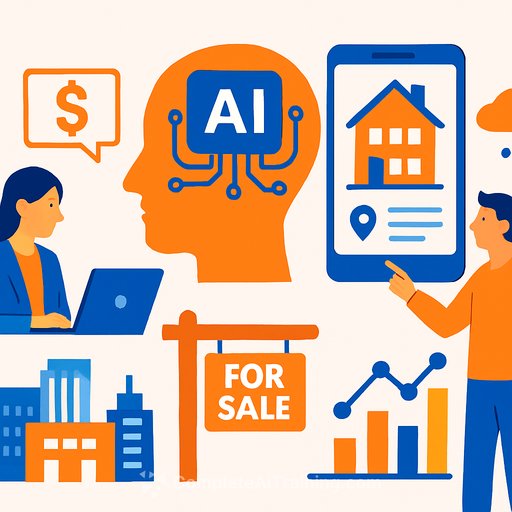The Ascendancy of Generative AI in the Real Estate Sector
Generative AI is transforming multiple facets of the real estate industry—from home marketing and portfolio evaluation to urban planning. Industry experts estimate this shift could generate tens of billions in value. McKinsey projects that generative AI could add between $110 billion and $180 billion annually by improving operational efficiency, speeding up transactions, and creating new revenue opportunities.
Visible Change at Ground Level
Recent examples highlight this trend. Zillow launched AI Assist in June, powered by EliseAI, to streamline communication between renters and property managers, turning inquiries into leases. Startups like HouseWhisper, introduced in February, provide agents with 24/7 AI assistants handling follow-ups, scheduling, and updates via voice and text.
The Employment Dimension: A New Paradigm
The workforce impact goes beyond automation. Real Estate Investment Trusts (REITs) employ about 3.5 million people and generate roughly $277.8 billion in labor income, according to an EY study commissioned by Nareit. The global real estate market was valued at $3.5 trillion in 2022 and is expected to grow to $4.2 trillion by 2027 at a 2.8% annual rate. As AI adoption grows, roles are shifting toward data stewardship, portfolio analytics, AI reporting, and tenant technology—skills increasingly sought by REITs and reflected in training programs.
Strategic Allocations by Executives
Executives are allocating significant budgets to AI. The Deloitte 2024 Commercial Real Estate Outlook reports that over 72% of global real estate owners and investors are investing in AI-enabled solutions, signaling a move from experimental pilots to ongoing programs.
Pragmatic Applications of AI
The focus is on practical, time-saving uses rather than futuristic concepts:
- Listings & Marketing: AI drafts property descriptions, generates virtual staging images, and creates video tours, accelerating market readiness and boosting engagement.
- Lease and Document Review: AI summarizes complex leases, extracts key terms, and flags risks at scale, reducing back-office workload.
- Valuations & Pricing: Tools like HouseCanary’s AI-powered Automated Valuation Models (AVMs) and forecasts speed up pricing and market analysis.
- Tenant Experience: AI agents handle maintenance requests, tour scheduling, and communication, improving response times and conversions.
- Operations: Combining IoT data with predictive modeling helps property teams anticipate equipment failures and optimize energy use, supporting smart district initiatives.
Global Initiatives
Worldwide, AI adoption in real estate is accelerating. Dubai’s Bayut launched TruEstimate, an AI valuation tool using official land data for instant price assessments, part of a larger effort to centralize AI in regional real estate transactions. The Saudi ROSHN Group partners with Google Cloud to modernize data infrastructure and embed AI in planning and operations. In Abu Dhabi, Aldar and Siemens collaborate on a smart district project using cloud tech to reduce emissions and forecast maintenance. Dubai’s crown prince has initiated an AI-driven urban design platform, one of the first to integrate generative AI in city planning at scale.
The Rationale Behind the Timing
Two key factors drive AI adoption: a rich, digitized data trail—from MLS feeds to sensor logs—and the availability of affordable, advanced AI models. This combination moves AI from novelty to integral workflow component. Analysts identify four primary benefit areas, called the “four Cs”: conciseness (summarizing unstructured data), customer engagement (chatbots and assistants), content creation (images and designs), and coding efficiency (streamlining internal tools). These align closely with real estate operations.
Challenges on the Horizon
Leaders face challenges including data quality, ownership, AI governance, and demonstrating clear ROI. Deloitte stresses the need for reliable data pipelines and vendor oversight. McKinsey highlights executive alignment, proprietary data “lakehouses,” and specialized AI prompt libraries focused on real estate tasks as essential for scaling AI beyond pilot projects.
Upcoming Developments to Monitor
- Consumer Search Integration: Conversational tools on listing platforms may shift conversion rates and advertising spend.
- Municipal-Level Implementations: Dubai’s urban design platform will test generative AI in zoning, transportation, and community engagement.
- Operational Data Flywheels: Smart districts could prove the financial viability and payback speed of portfolio-wide predictive maintenance.
In the next year, success will likely come not from flashy chatbots but from firms that rebuild foundational systems—data standards, governance, and human-in-the-loop processes—to support generative AI at scale. The sector’s future looks set for steady, software-driven progress rather than abrupt change.
Your membership also unlocks:






